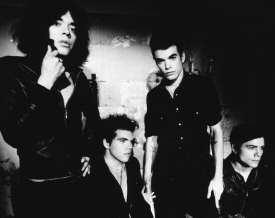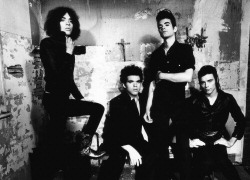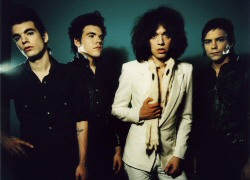 Interview
with Living Things: If it ain't political, it ain't punk Interview
with Living Things: If it ain't political, it ain't punk
by: Mojo Flucke, Ph.D.
10/12/05
Living Things might be one of the hottest
up-and-coming power punk foursomes around, with opening gigs for the Vines,
Velvet Revolver, and the Libertines under their belts and a Steve Albini-produced
debut CD, Ahead of the Lions just out on Jive Records. We sat down with
frontman Lillian Berlin, who also writes the group's words and music. Diagnosed
with attention deficit hyperactivity disorder, he's got some pointed views about
how the modern medical culture treats its children, laid out in this interview
and much more in depth in his forthcoming book Post Mortem Bliss,
published by Apocrypha.
|
Bullz-Eye: Introduce your band to our readers, many of whom probably haven't
heard of you.
Lillian
Berlin: I'm a living thing, and I'm in Living Things. I'm Lillian Berlin,
and our band is Eve Berlin on bass, Bosh Berlin on drums and Corey Becker on
guitar. We're from St. Louis, Missouri, a place that doesn't have a real rich
musical community right now. Back in the day it did, with Chuck Berry, but not
any more. In St. Louis, you're taught to pray, play sports, and drink beer, so
growing up the best local talent was the preacher man who spoke in tongues like
an angel.
BE:
How would you describe the sound of your music?
LB:
Anxious and ill at ease.
BE:
Where are you now -- album's out, what's next?
LB:
We'll be touring at the end of the year through all of next year, playing
everything from regular clubs to fairgrounds and street corners.
BE:
You've been working with Steve Albini for a couple years; he produced a couple
EPs for you before this latest CD. How'd you hook up?
LB:
We were in Chicago playing a gig. His studio's listed in the phone book and we
called over there because we wanted to record at the studio -- not knowing you can
record with him. He answered his phone -- I guess he always answers his phone -- and
we said, "Hey, we're big fans, we want to record with you!" He said, "Sure, no
problem, I record everyone… come on in whenever you want." We went in, and it
was the start of a fabulous relationship.
BE:
Wow! Talk about the power of motivation, just cold-calling a legendary producer
– and it works. How does he interact with the band? Does he do arranging or
anything like that? Or does he take the tapes away and come back when he's done
and say "You like this?"
LB:
He basically captures the moment on tape. He doesn't direct you or tell you what
to do. He takes a snapshot; he's more of an archivist or compiler than a
producer.
BE:
But he's known for bringing an edge to some band's sound. I remember one he did
in 1991 for the Wedding Present. All their other albums were kinda dull and
muddy but the one he did was razor sharp sounding. A little flavor of Big Black
or Shellac. What does he do for Living Things?
LB:
He's got his style; every artist has their style. He has his way of doing things
for everyone. That's why you work with him, because you've heard other albums
you like and you want his imprint on it, the Steve Albini jizz covering our
music.
BE:
Tell me about "Bombs Below," the opener on the new CD.
LB:
That song was a fictional story I wrote [long before the Iraq war] about kids
getting recruited into the military and not wanting to go to war – or getting
recruited and not understanding they'd be sent off to fight a war they didn't
believe in. And it slowly became reality.
BE:
You're pretty politically outspoken. What's your take on the Iraq war?
LB:
They've made the disaster of terrorism equal the new capitalism. A city gets
under water and [the Bush Administration] brings in all their people to rebuild
the city and make all of their contractors and the group of businessmen who are
in with the government of our country… richer. Same thing with terrorism.
Prime
example: 9/11, a terrible event, and then you have the mayor of New York going
to different countries, paid a million dollars to set up new rules about
terrorism, and he doesn't even show up – he sends his people… it's sort of like
terrorism and destruction has become a new way to make money.
BE:
Tell me about "Bom Bom Bom," the new single.
LB:
The story behind that song is: It's sort of written behind the eyes of a marine
on the battlefield and he's going to light up this city with bombs, fireworks,
taking over a city that didn't [invite him].
BE:
Your songs also reference religion quite a bit. Why's that – because you grew up
in the Midwest?
LB:
Growing up in St. Louis, I have been around a lot of Republicans, I have a lot
in my family. My mother's Catholic, my father's Jewish, so we had a taste of
both religions. Politics, these days, and religion are of the same thing.
Politicians who run America today take advantage of religion, mix it into their
politics, and really don't divide church and state very well. I don't know why
they're doing it – I feel like the Republican party today these days is a lot
more religious than it's ever been. They're not real Republicans.
BE:
Meaning?
LB:
They're distorting religion, just like they distorted terrorism. They're saying
that God came down and destroyed New Orleans. You know what, if they would have
taken precautions and listened to [engineers], God would not have destroyed New
Orleans. God would have done His thing and New Orleans would have been
protected.
BE:
Tell me about your forthcoming book and why you felt compelled to write it.
 LB:
Basically, it's a snapshot of my life growing up in the Midwest in the 1990s
from 13 to 18 years old. I didn't set out to put this together, but I put it
together because I felt it's a story that hadn't been told yet. The greatest
thing in art is the story you don't hear sitting around your kitchen table every
day. Artists sort of bring out the stuff in life that mainstream media wouldn't,
necessarily. LB:
Basically, it's a snapshot of my life growing up in the Midwest in the 1990s
from 13 to 18 years old. I didn't set out to put this together, but I put it
together because I felt it's a story that hadn't been told yet. The greatest
thing in art is the story you don't hear sitting around your kitchen table every
day. Artists sort of bring out the stuff in life that mainstream media wouldn't,
necessarily.
My story is
the story of what a lot of kids went through in the 1990s: The big whole ADD and
ADHD phenomena kicked in. Kids were getting diagnosed with ADD – which is just a
glorified term for daydreaming. You'd get put on Ritalin or Prozac or Paxil, all
these mood-controlling prescriptions, but since you were under the age of 18,
you didn't have a choice. You'd have your teacher or your parents telling you to
do it. In my school, if you were diagnosed with ADD you'd be put in a special
district for handicapped kids. I think that's obnoxious, because every kid
daydreams and every kid is wild. It's just that some kids are more wild and some
kids daydream more than others.
Another
[part] of my book deals with living in a repressed Christian city like St. Louis
and how that affects your values, coming of age.
BE:
So you were diagnosed with ADHD. Are you saying it's a myth, or something you
grow out of, or something you manage now?
LB:
I don't believe it's an actual thing. The reason marijuana hasn't been made
legal is because small doses of it kind of heals you, you feel numb.
Prescription pills, you have to take a large dose and spend lots of money to get
that numbness, which means it makes the pill companies a lot more money than
marijuana would. ADD and ADHD are terms they made up some sort of marketing
scheme for [pharmaceutical companies] could make more money. Everybody's got to
make money, but it affects children, who really don't have a choice. If you're
under 18, you don't have a choice. If you're over 18 and you want to take
Prozac, that's your problem.
BE: Reading
about how big pharmas operate and the antidepressant/teen suicide and Vioxx
scandals, it's sometimes hard to figure out where the disease treatment ends and
the marketing starts. George Bush is pro-business. He also runs the FDA, he's
overseeing charge of that government agency.
LB: Look at
Bush for a second. He's doing exactly what he's supposed to do: make his friends
money. He's not failing, it's just that he's not a politician, he's completely a
businessman. His business is dirty business, and it's affecting our lives.
Abraham Lincoln said it best when he said "America will never be destroyed from
the outside. If we falter and lose our freedom, it will be because we destroy
ourselves," and that's exactly what we're doing right now.
BE:
What words of encouragement would you have to leave with your fans who might be
diagnosed with ADD and ADHD, having gone through it yourself?
LB:
Take that prescription pillbox and flush it down the toilet because it's a bunch
of bullshit. I was diagnosed with ADD and they said I wouldn't be able to read a
whole book. Well, I've probably read more books than 90% of the people my age
have read. The teachers said when I was 14 that I couldn't make it through a
whole book, which made no sense. Public school systems are funded by the
government, so it comes from the top.
There's no
reason for a school to have you meet with a counselor to see if you have ADD.
What does the school have to do with the way you think or act? That's your
parents' decision. When it comes from a public school that you have this problem
and gets to your parents, it puts your parents in a shitty place when they have
to send you to a public school because they can't afford to send you any place
else--so they do what the school says. It's scary stuff. If you have ADD or
ADHD, you're just like everybody else, because everybody daydreams, and
everybody gets hyper. It's just that some people are more hyper than others.
BE:
You count Michael Moore as one of your political influences. What is it about
him that makes him such an easy whipping boy for the Republican right?
LB:
I gotta say, Michael Moore is great. I'm proud there's someone like him. The
problem with him—and Cindy Sheehan—is that they're older people. Younger people
look up to people their age. If you had Eminem up there doing as much as Michael
Moore, you could make a real difference.
We just
played at [the late-September protest concert] Operation Ceasefire down in
Washington and a lot of the people that were there—and who had strong
opinions—were over 40. That's great, but we need young people doing something.
The young people are the future of America. If the young people who are more
conservative than the elders, then we have a serious problem. Look back at the
1960s. The teenagers were revolting, not the older people. What's great about
now is that the older people were around back then so we're in a better place
now. Now, if the younger people would agree with the older people…
 BE:
(Laughing at this irony) So that dovetails with my next question: What do you
have to say to the young people out there who say "Screw it, I'm not going to
get involved in politics because I can't make a difference in who's president or
the war, or who's making the laws in my city, these losers buy their way into
office an you can't stop it." Why is it important to get involved? BE:
(Laughing at this irony) So that dovetails with my next question: What do you
have to say to the young people out there who say "Screw it, I'm not going to
get involved in politics because I can't make a difference in who's president or
the war, or who's making the laws in my city, these losers buy their way into
office an you can't stop it." Why is it important to get involved?
LB:
The deal with us – or with anybody is – you don't have to do what anybody is
preaching. The role of the preacher is to open people up; you can agree with
some of it and disagree with some of it.
But if the
children are more conservative than their elders, we will become a more
conservative society. Right now, in 2005, it feels like we're more conservative
than 1955. But the scary part is that back in 1955 they were more open about it,
but now there's shadow censorship.
BE:
We'll finish by circling back to the music. Tell me about four or five favorite
bands and why you like them.
LB:
Fugazi, I love the attitude and lyrical content. Bob Marley, I always feel is a
strong force to be reckoned with—the power of his voice conveys a message
lacking in many artists. John Lennon, post-Beatles, had a voice as passionate as
Marley had. And I've always enjoyed bands like the Dead Kennedys, who recently
pulled out of a punk rock show because it was sponsored by Coors. They've stuck
to their values for over 20 years. That's cool, not selling out.
BE:
I find it interesting that you choose influences according to lyrics and
political orientation, as opposed to the sound of the guitar or musicianship.
LB:
You can come to our show and like us for the message, or you can come and like
us for the riffs. You don't have to become Mother Teresa, but our job is to
continue the rock-n-roll tradition: Help inform listeners what's fucked up in
society. Lately, rock-n-rollers have become these saints or something.
BE:
Anything else to add?
LB:
Nothing, except we've got to bring a little more love to the world and a little
less hate.
Send any questions or comments to mojo@bullz-eye.com.
|